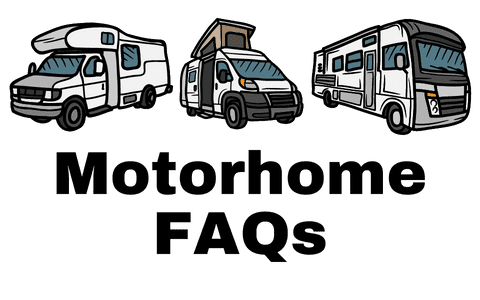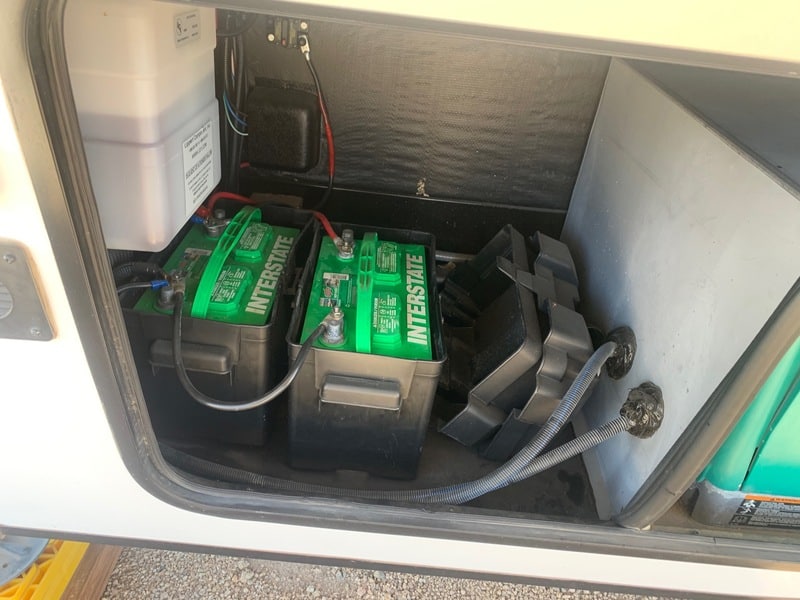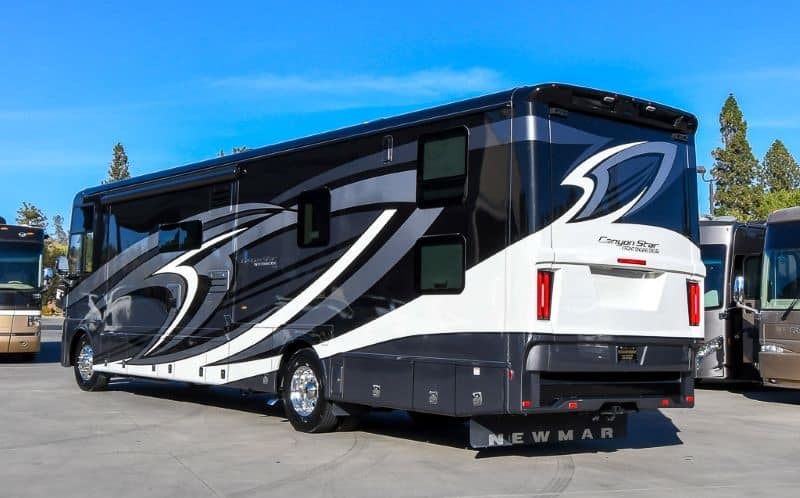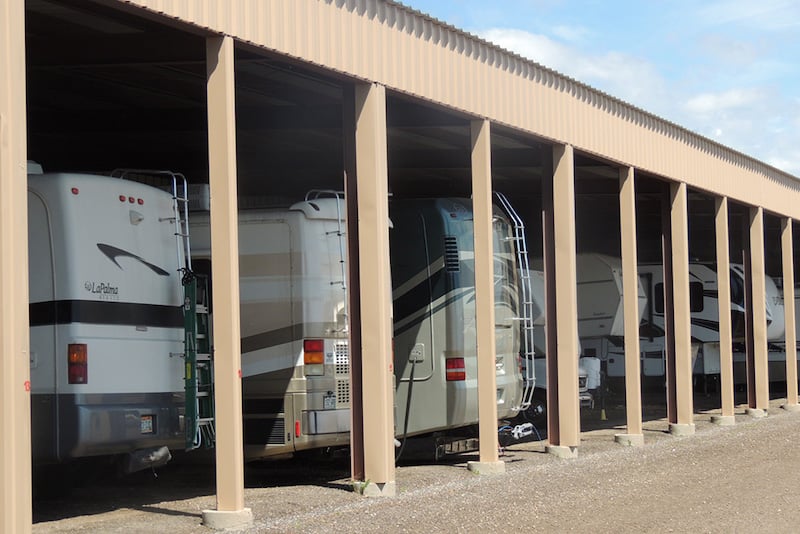Do RV outlets work on battery power? Everything in your RV is fairly seamless or should be when you are attached to shore power. When you start talking about how RV outlets work on battery power, it can lead to conversations about inverters, converters, solar panels, solar controllers, and generators. Before going down that long and twisty road, you might need some clarification.
Let’s take a look at how RV outlets work on battery power.
How Do RV Outlets Get Power?
RV outlets can be powered by shore power, which is hooked up from the post at your campsite to your RV via an electrical cord.
RV outlets can also work on generators and batteries when you’re boondocking.
Direct current outlets are powered by the electricity stored in your coach batteries. 30-amp motorhomes typically have two 6-volt deep cycle batteries that look like car batteries. 50-amp motor coaches usually have two 12-volt deep cycle batteries.
These lead-acid batteries are made up of lead plates, and lead oxide is stored in an electrolyte substance of sulfuric acid and water. The bigger the lead plate and volume of electrolyte in the battery, the more charge it can store.
Deep cycle batteries, or house batteries, offer a steady current over a period of time.
What’s the Difference Between Battery Power and Shore Power?
Shore power is an AC (alternating current) power source. Shore power comes to your RV via a pedestal in your campsite that you connect to your RV with an electric cable. Batteries in your RV run on DC (direct current).
What Does a Battery Power in Your RV?
Batteries in your RV can power the lights, water pump, and small appliances. Under normal circumstances, an RV battery can run for 2-3 days. You can extend this by conserving electricity, turning lights off, or adding another battery.
The Types of Outlets in an RV
Generally, an RV will have 110-volt and GCFI outlets, while some might have 240-volt outlets, which can run an electric furnace or an electric water heater.
1. 110/120-Volt Residential Outlets
110 or 120-volt outlets supply power to household appliances and TVs. They only work when plugged into shore power, when the generator is on, or when your RV outlets work on battery power through an inverter.
2. GFCI Outlets
A Ground Fault Circuit Interrupter (GFCI) is a fast-acting breaker designed to cut off electricity to protect an electrical device and your RV’s electrical system. When the GFCI (a.k.a. GFI) breaker trips, you reset the outlet by pushing in the “Reset” tab.
3. 220/240-Volt Outlets
240-Volt outlets are meant for large, motor-driven appliances that need more electricity. This could be a water heater or RV furnace. 240-Volt outlets are larger than standard 120-Volt receptacles, have round outlets, and have 3 or 4 prongs.s
RVers know 240-Volt outlets well. 30-amp cords are the 3-prong shore power cords used at campgrounds. 50-amp motorhomes and travel trailers use the 4-prong cord.
Understanding the Difference Between AC & DC Electricity
In simple terms, AC and DC describe the current flow in a circuit. DC only flows in one direction. AC changes direction periodically to flow both ways.
How Does an RV Turn DC Power into AC Power?
To run your appliances, your RV uses an inverter to change DC (direct current) from your battery to AC (alternating current). The inverter’s job is to make the two types of power compatible.
Inverters are great when you are dry camping or don’t have access to 120-volts AC. Your inverter should be turned off when not in use because it can drain power from the batteries even when not in use.
The Two Battery Systems in Your RV
Starter or Chassis Battery
The starter battery in your RV is like the battery in your car. As the name indicates, it provides a burst of power to get the engine running.
House or Coach Battery
The house or coach batteries, sometimes called deep-cycle batteries, provide DC power to your RV appliances, such as 12-volt TVs and electric refrigerators.
House batteries expel less energy but must last for a long period of time. They provide a long, steady stream of power and are designed to be discharged and recharged regularly. RV builders provide one or two batteries depending on your RV’s power needs.
How Can RV Outlets Work on Battery Power?
Outlets in your RV are 120 volts AC, and your batteries are 12 volts DC. The only way to get power to the outlets is to use an inverter which will transform the energy and allow you to use your outlets.
How Else Can I Power My RV Outlets?
There are several ways you can power your RV outlets. Those include:
Solar Power
Many RVers use solar power to keep their house batteries charged. Solar power can be a great option but can be a bit expensive. Even a small solar panel setup can run around $600. A larger installation can be over $5,000.
Solar panels for RVs are between 100 and 400 watts of power. On average, an RV needs around 120 watts of energy to run the lights and some essentials while boondocking. That doesn’t include air conditioning.
So, an RV will need three 400-watt or ten 200-watt solar panels or more to meet the RV’s energy demands, including small HVAC energy demands.
Generators
An RV generator provides electricity to run various appliances and equipment in your RV. A generator usually runs on gasoline or propane. It feeds the electricity via the circuit breaker panel and provides the power to operate your converter, which charges your RV house batteries.
Built-in generators run on the gas from your tank, and stand-alone generators must be refueled directly into the gas tank.
Wattages generally range from 2,000 to 12,500 watts depending on the size of your RV and what you want to power.
Shore Power
Shore power is when you hook up your RV to an outside power source via an electric cable. This is usually an option at an RV park or campground with full hookups. Sometimes an RV resort will charge for electricity, so be sure and ask when you make your reservation.
Also, invest in a good surge protector. If there’s a lightning storm or a malfunction in the power grid, a surge of electricity can damage appliances or electronic equipment.
8 FAQs About RV Outlets and Batteries
1. Are RV Outlets and House Outlets the Same?
RV outlets are smaller, containing boxes designed to fit inside shallow walls. They can also be easily overloaded. House outlets have a more complex wiring system and are more deeply set into the wall.
2. Can You Run Your RV Air Conditioner on Battery?
The simple answer is yes, but you’ll need, at minimum, four 12-volt batteries to run a rooftop RV air conditioner.
In addition to the batteries, you’ll also need an inverter if you don’t have one.
3. Can You Run RV Appliances on Battery Power?
The amount of power your RV batteries provide is fairly low. You can run the lights, water pump, and small appliances. The more batteries you have, the more power you have and the more you can run.
4. What Runs Off a 12-Volt System in an RV?
The 12-volt system is powered by batteries and powers things such as the start-up of your water heater, furnace, and refrigerator. The lights, water pump, most appliances, and other items also rely on the house batteries.
If your TV isn’t a 12-volt, it needs a generator, shore power, or an inverter to change the house battery power to AC power. The same is true for your RV air conditioner.
5. Why Aren’t My RV Outlets Working?
The most common reason your outlets might not work is that a GFCI outlet is tripped in your RV. Check the outlet closest to the inactive electric appliance and then work your way out.
You also want to check to make sure your inverter is powered on. You may have to turn on your onboard generator or plug into shore power.
6. How Long Will My Battery Last Without Being Plugged In?
Under normal conditions, using lights, a propane refrigerator, a water pump, etc., and a 12-volt battery, you can boondock for 2-3 days.
7. Should I Use Interior RV Surge Protectors When on Battery Power?
A surge protector is a must-have between the RV electrical system and your shore power source or battery recharge system. A surge protector ensures that the power is cut to the RV in the event of a surge.
Surge protectors on outlets inside your RV are a good idea, particularly if you want to plug in multiple items. They can be another level of protection against an electrical surge.
8. Can You Overcharge Your RV Battery?
Yes, you can overcharge your RV battery. Leaving your RV battery plugged in after it’s fully charged can deplete the cells’ electrolyte levels, reducing battery life.
An RV converter with a three or four-stage charging process, called a smart charger, can help to eliminate overcharging. You can also attach a battery tender to keep it from draining too low and ruining the battery.
Overcharging your battery can diminish the life of your battery.
Smart converters, also known as three-stage converters, can be used on your RV battery. Smart converters use different charging settings depending on the situation.
This could be bulk, which charges your battery very quickly. Absorption is a slower method, and float is the charging that ensures the battery remains well-charged.
If you use a smart converter, ensure it doesn’t get stuck in bulk or absorption mode. A smart converter is a great investment and will help you keep an eye on your batteries so you don’t get stuck with a dead battery.
Final Thoughts on Using Your RV Battery to Power Electrical Outlets
RV batteries might be something in your RV that you don’t give a lot of thought to, particularly if you don’t do a lot of boondocking. However, maintaining your batteries is important to your overall RV maintenance.
It’s only in the past couple of years that RV brands have built their products where some RV outlets work on battery power. The idea of adding an inverter to an RV’s electrical system is still relatively new. Before solar power made inverters popular, RVers relied on their gas/diesel onboard generator coach power when not plugged in.
You must remember that your RV battery runs things such as slides, tongue jacks, stabilizer jacks, etc. These items are important to your setup process and getting ready to leave. You can plug your RV into the tow vehicle and get the power if you have a travel trailer.
Some final things to remember. Your RV batteries generally last 3-4 years and need regular upkeep to keep everything running smoothly in your RV. Proper upkeep of your batteries will help keep you on the road to get the most out of your RV life.
About the Author:
Terri Nighswonger and her husband Todd have been RVing and work camping for five years with their Cavalier King Charles Spaniel, Newton, and their Minnie Australian Shepherd, Remi.
They originate from the Midwest but plan to enjoy the West for a few years, wintering in Arizona and summering wherever the road may lead. Writing is Terri’s passion, but she also loves hiking, kayaking, walking her dogs, and anything she can do outdoors.




